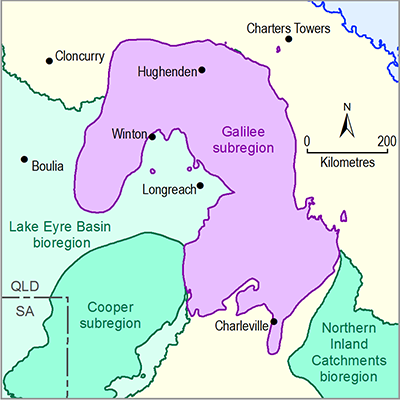- Home
- Assessments
- Bioregional Assessment Program
- Galilee subregion
- 2.7 Receptor impact modelling for the Galilee subregion
- 2.7.2 Overview
- 2.7.2.7 Outline of content in the following landscape group sections
Section 2.7.3 to Section 2.7.6 of this product focus, respectively, on each of the four main landscape groups potentially impacted by coal resource development in the Galilee subregion. After the summary of baseline information, each section details the qualitative mathematical modelling that was undertaken. The qualitative modelling component includes the development of signed digraph models of key ecosystem components, a summary of cumulative impact scenarios and calculation of predicted responses of the signed digraph variables in each of the models to changes in hydrological response variables. Each section then describes the receptor impact modelling, if undertaken, detailing the elicitation scenarios that were presented to the experts at the workshops and the receptor impact models developed.
The details provided in this product on the ecology of the landscape groups together with results of qualitative mathematical modelling and receptor impact modelling are in effect an appendix of information that is used in the impact and risk analysis of the BA for the Galilee subregion (companion product 3-4 (Lewis et al., 2018)).

Product Finalisation date
- 2.7.1 Methods
- 2.7.2 Overview
- 2.7.2.1 Introduction
- 2.7.2.2 Potentially impacted landscape groups
- 2.7.2.3 'Springs' landscape group
- 2.7.2.4 Streams landscape groups
- 2.7.2.5 'Floodplain, terrestrial GDE' landscape group
- 2.7.2.6 'Non-floodplain, terrestrial GDE' landscape group
- 2.7.2.7 Outline of content in the following landscape group sections
- References
- Datasets
- 2.7.3 'Springs' landscape group
- 2.7.4 Streams landscape groups
- 2.7.5 'Floodplain, terrestrial groundwater-dependent ecosystem' landscape group
- 2.7.6 'Non-floodplain, terrestrial groundwater-dependent ecosystem' landscape group
- 2.7.7 Limitations and gaps
- Citation
- Acknowledgements
- Contributors to the Technical Programme
- About this technical product
